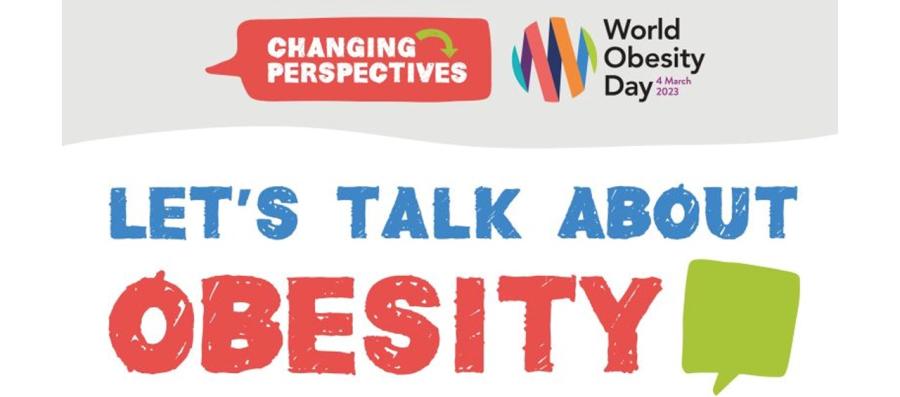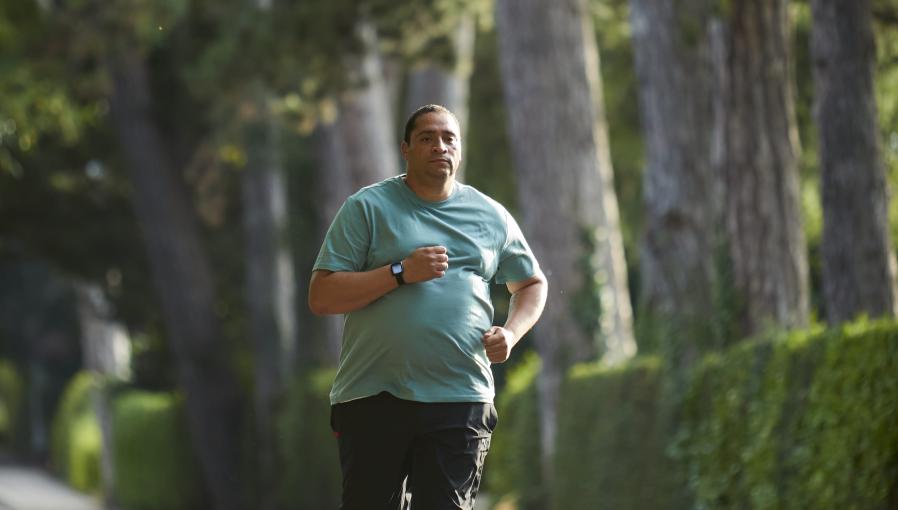World Obesity Day – Debunking obesity myths!

Changing perspectives – let’s talk about obesity
Allurion, an official World Obesity Federation partner, is marking World Obesity Day 2023 on Saturday, March 4 by increasing our efforts to empower individuals on their journey towards a healthier lifestyle.
We know that weight loss is never easy. That’s why it’s important to keep raising awareness of the challenges that millions of people face every day while living with obesity.
This year’s World Obesity Day theme is “Changing perspectives: Let’s talk about obesity” – and we think that’s a perfect opportunity to address common misconceptions about obesity and weight loss. By confronting these myths and changing perspectives, we hope to recognize obesity for what it is - a serious global healthcare concern.
The global obesity epidemic is one of the most pressing health issues of our time. By 2030, it's projected that over a billion people will be living with obesity. According to the World Obesity Federation, this means that in just 7 years, 1 in 5 women and 1 in 7 men will be affected by obesity if action isn't taken now.1
What is obesity – and what causes it?2
‘Obesity’ is a term used a lot, but what does it really mean?
In fact, ‘overweight’ and ‘obesity’ are separate conditions. A body mass index (BMI) of 25 or over is considered overweight, while a BMI of over 30 is considered obese. Overweight and obesity occur when excess weight – via the accumulation of fat – results in a risk to your health. Obesity often results from a complex mixture of dietary, lifestyle, genetic, psychological, sociocultural, economic and environmental factors.
It’s a complicated, chronic disease – a long-term condition that’s not quick or easy to beat.
But that doesn’t make it impossible.
Debunking obesity myths
Fighting obesity means challenging myths and stereotypes about obesity and weight loss to ensure everyone can make informed decisions about their healthcare.
Being able to tell fact from fiction means better decision making and a better chance of choosing a weight-loss solution that really works.
Here, we debunk just a few of the myths we are asked about regularly. This is one of the most common myths – and it’s fuelled the weight-loss industry for decades. It may be possible to shed a few kilos by dieting alone, but maintaining that weight-loss over the long term is much harder. In fact, studies show that around two-thirds of people who lose weight through dieting end up putting it back on within a year.4 To lose weight – and to keep it off – requires not only changes to your diet, but also improvements in other areas, such as increased activity levels, and regular self-monitoring of body weight and food intake. It’s worth noting also that some fad diets can actually lead to a weight gain.5,6
MYTH: Obesity is caused by a lack of exercise.
If only it were that simple, we’d have solved the obesity crisis a long time ago! It’s a myth that a lack of exercise directly results in obesity. A wide range of factors can contribute to overweight and obesity – and often there is no one single cause. Contributing factors may include a poor diet and a lack of exercise, but also family history, cultural influences, and your education or socioeconomic background. Even a lack of sleep, stress and some medications can result in excess weight accumulation.3
MYTH: Anyone can lose weight just by dieting.
This is one of the most common myths – and it’s fuelled the weight-loss industry for decades. It may be possible to shed a few kilos by dieting alone, but maintaining that weight-loss over the long term is much harder. In fact, studies show that around two-thirds of people who lose weight through dieting end up putting it back on within a year.4 To lose weight – and to keep it off – requires not only changes to your diet, but also improvements in other areas, such as increased activity levels, and regular self-monitoring of body weight and food intake. It’s worth noting also that some fad diets can actually lead to a weight gain.5,6
MYTH: Cut out either carbs or fat and you’ll lose weight.
Unfortunately, there’s no simple one-size-fits-all approach to weight loss like this. There’s no evidence to suggest that cutting carbs will lead to better weight loss result than cutting fat (or vice versa). Everyone is different – and everyone’s ability to comply with a strict diet is also different. What else is different? Well, there are lots of different types of fats (saturated, unsaturated, etc), and lots of different types of carbs (processed or with added sugar, etc) and that’s before we even consider what else in those same foods may either influence weight loss or weight gain or be good for us (like macronutrients or protein. And it also fails to take our activity levels into account. So, it’s just not as simple as making a blanket rule about fat or carbs and expecting to see the kilos fall off.7
MYTH: It’s easy to lose lots of weight if you just do lots of exercise.
Again, this is a myth. Studies show that exercise alone only leads to modest weight loss of – on average – less than 2 kilograms.8 However, including regular exercise in a structured weight-loss programme like Allurion’s can help you to lose weight – and keep it off – while also improving your overall health.9
MYTH: I’m overweight because I have big bones.
It’s true that the human skeleton comes in all sizes – some people have larger frames than others.10 Even so, human bones don’t actually weigh that much – the average skeleton makes up just 15% of overall body weight.11
MYTH: A slow metabolism leads to weight gain.
Your metabolism is the rate at which your body converts food (and the calories in it) into energy. Regardless of whether your body burns calories faster or more slowly, your metabolism isn’t usually the deciding factor when it comes to weight gain. So much else is also going on in your body: factors like how much you’re eating, how much exercise you’re doing, your body size, your age and your gender all come into play when determining how many calories your body uses up. Ultimately, weight gain is the result of eating more calories than your body burns.12
Why we need to fight obesity now
In addition to dispelling myths and misconceptions about obesity and weight loss, it is also important to understand the significant impact that obesity can have on an individual's health. People living with obesity are at a higher risk of other health conditions like type 2 diabetes, heart disease and infertility compared to people who are able to maintain a healthier weight.13 Obesity may also play a role in the development or management of several conditions that specifically affect men, including erectile dysfunction and prostate cancer, among others.14,15
And these are just physical conditions – living with obesity can also result in additional mental health challenges, such as low self-esteem, depression and body image concerns.16
In addition, the rise in obesity rates places a heavy burden on public health systems by increasing the demand for medical services and resources. This emphasizes the urgency of addressing the issue of obesity and working towards finding effective solutions.
The Allurion Programme – fast, healthy and sustainable weight loss
When it comes to tackling obesity, there are numerous weight loss solutions available, including bariatric surgery and prescription weight loss drugs. While these options can provide effective results, they often come with their own set of challenges, including high costs, risks, and side effects. To help you weigh your options, we explore the pros and cons of bariatric surgery here and we compare surgery, weight loss drugs, and the Allurion Programme in this special World Obesity Day article.
The Allurion Programme offers a unique and effective solution to individuals looking to lose weight quickly, in a safe and healthy way. Adopting a comprehensive approach to weight loss, it combines:
-
The temporary and non-invasive Allurion Gastric Balloon;
6 months of personalised nutrition coaching and aftercare;
Monitoring of progress and contact with your clinic using your own Allurion Health Tracker, the Connected Scale and the Allurion App
Having the balloon helps you feel fuller so you eat less, and it helps to reduce hunger pangs and snack cravings as well. The 6-month nutrition coaching and ongoing support from the clinic team help you establish healthy eating habits and make lasting behavior changes. This powerful combination leads to sustained weight loss and a healthier lifestyle, all without undergoing any painful procedures or relying on medication.
Our global research tells us that most people who want to lose weight – people like you! – find support from a nutritionist helpful.17
To meet the diverse weight loss needs of global populations, the Allurion Programme offers three options to cater to individuals with varying Body Mass Index (BMI) levels and weight loss goals.
-
A single Allurion Balloon placement with a 6-month programme
A single Allurion Balloon placement with a 12-month programme
Placement of two sequential balloons over a 12- to 17-month programme.
Clinically proven results with the programme
The Allurion Balloon is an effective solution for combating obesity, as shown by multiple clinical studies. Patients on the Allurion Programme can expect to lose an average of 10-15% of their total body weight in just 16 weeks, with 95% of that weight loss sustained after one year.18,19
In the first month of the programme, patients lose on average 7.5% of their total body weight20,21, with 50% of their target weight loss achieved within the first 30 days after placement.21
These results demonstrate the effectiveness of the Allurion Programme in helping individuals achieve significant and sustained weight loss.
Take your first step towards beating obesity
On the Allurion Program, you can lose weight safely and successfully – without the additional risks and complications that come with bariatric surgery or weight-loss drugs.
You can use our BMI calculator to see if you’re eligible for an Allurion Gastric Balloon. The next step is to book your free consultation.
Find your nearest clinic here.
Credit: First 3 photos are from https://www.worldobesity.org/
REFERENCES
-
One billion people globally estimated to be living with obesity by 2030. World Obesity Federation. https://www.worldobesity.org/news/one-billion-people-globally-estimated-to-be-living-with-obesity-by-2030. Accessed January 25, 2023
Obesity. World Health Organization. https://www.who.int/health-topics/obesity. Accessed January 25, 2023.
Chaput, P., Ferraro, Z. M., & Sharma, A. M. (2014). Widespread misconceptions about obesity. Canadian Family Physician, 60(11), 973-975. https://www.ncbi.nlm.nih.gov/pmc/articles/PMC4229150/
Wadden TA. Treatment of obesity by moderate and severe caloric restriction. Results of clinical research trials. Ann Intern Med. 1993;119(7 Pt 2):688–93.
Ogden LG, Stroebele N, Wyatt HR, Catenacci VA, Peters JC, Stuht J, et al. Cluster analysis of the National Weight Control Registry to identify distinct subgroups maintaining successful weight loss. Obesity (Silver Spring) 2012;20(10):2039–47. Epub 2012 Apr 3.
Utter J, Denny S, Robinson E, Ameratunga S, Crengle S. Identifying the ‘red flags’ for unhealthy weight control among adolescents: findings from an item response theory analysis of a national survey. Int J Behav Nutr Phys Act. 2012;9:99.
Gardner CD, Trepanowski JF, Del Gobbo LC, et al. Effect of Low-Fat vs Low-Carbohydrate Diet on 12-Month Weight Loss in Overweight Adults and the Association With Genotype Pattern or Insulin Secretion: The DIETFITS Randomized Clinical Trial. JAMA. 2018;319(7):667–679. doi:10.1001/jama.2018.0245
Thorogood A, Mottillo S, Shimony A, Filion KB, Joseph L, Genest J, et al. Isolated aerobic exercise and weight loss: a systematic review and meta-analysis of randomized controlled trials. Am J Med. 2011;124(8):747–55.
Hill JO, Wyatt HR, Peters JC. Energy balance and obesity. Circulation. 2012;126(1):126–32.
Wing RR. Physical activity in the treatment of the adulthood overweight and obesity: current evidence and research issues. Med Sci Sports Exerc. 1999;31(11 Suppl):S547–52.
Avtandilashvili, M.; Tolmachev, S.Y. Modeling the Skeleton Weight of an Adult Caucasian Man. Health Phys.2019,117, 149–155.
Can you boost your metabolism? Mayo Clinic. https://www.mayoclinic.org/healthy-lifestyle/weight-loss/in-depth/metabolism/art-20046508. Published October 8, 2022. Accessed January 25, 2023.
Prospective Studies Collaboration, et al. Body-mass index and cause-specific mortality in 900 000 adults: collaborative analyses of 57 prospective studies. Lancet 2009;373(9669):1083–96.
Infertility. World Health Organization. https://www.who.int/news-room/fact-sheets/detail/infertility. Published 2022. Accessed July 21, 2022.
Ahmet Tevfik Albayrak, Ege Can Serefoglu, Chapter 2.3 - Obesity and Men's Health, Academic Press, 2019, Pages 149-168, https://doi.org/10.1016/B978-0-12-816665-9.00007-X
Sarwer, D. B., & Polonsky, H. M. (2016). The Psychosocial Burden of Obesity. Endocrinology and metabolism clinics of North America, 45(3), 677. https://doi.org/10.1016/j.ecl.2016.04.016
YouGov for Allurion: A multi-country research in UK, France, Italy, Spain, Chile, UAE, Australia.
Ienca et al. Sequential Allurion Balloon Treatment 1- Year Weight Loss Results Approximate Bariatric Surgery Results, TOS Obesity Week, 2020.
Ienca R, Al Jarallah M, Caballero A, et al. The Procedureless Elipse Gastric Balloon Program: Multicenter Experience in 1770 Consecutive Patients [published correction appears in Obes Surg. 2020 May 5;:] [published correction appears in Obes Surg. 2020 Nov;30(11):4691-4692]. Obes Surg. 2020;30(9):3354-3362.
Gaur et al. 2015, GI Endoscopy.
Armijo PR, Pokala B, Flores L, Leon MA, Oleynikov D, Kothari V. Patients undergoing intragastric balloon achieve approximately 50% of their target weight loss in the first month postoperatively: an MBSAQIP analysis. Surg Obes Relat Dis. 2019 Dec;15(12):2060-2065.



